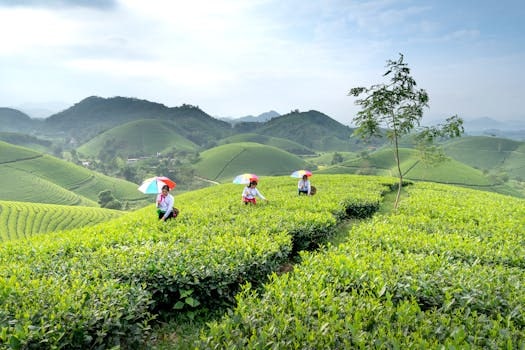Mountain Tea Plantations: High-Altitude Harvesting
If you’re a tea lover, you’ve probably heard of Darjeeling and Assam, the famous regions of India where premium tea is grown. But have you ever heard of mountain tea? This unique type of tea is grown at high altitudes and has a distinct flavor and aroma that sets it apart from other teas. In this article, we’ll explore the world of mountain tea plantations and how high-altitude harvesting contributes to the superior quality of this tea.
The Origins of Mountain Tea
Mountain tea, also known as “Greek Mountain Tea” or “Shepherd’s Tea,” comes from the leaves of the Sideritis plant. The plant grows in rocky, mountainous regions of Greece, Albania, and Turkey, where it has been harvested for centuries. In ancient times, mountain tea was revered for its medicinal properties and was used to treat a variety of ailments, such as colds, respiratory issues, and stomach problems. Today, it is not only valued for its health benefits but also for its unique taste and cultural significance.
The High-Altitude Advantage
One of the key factors that contribute to the exceptional quality of mountain tea is its high-altitude cultivation. The Sideritis plant thrives in cool, dry, and rocky conditions, which are abundant in the mountainous regions where it is grown. At higher elevations, the plant experiences more intense sunlight, cooler temperatures, and less rainfall, which results in slower growth and a more concentrated flavor.
High-altitude tea plantations are typically located at altitudes of 1000 meters or higher. This means that the plants are exposed to harsher environmental conditions, which forces them to produce essential oils and other compounds that enhance the aroma and flavor of the tea. This process is similar to how wine grapes develop more intense flavors when grown in higher elevations.
Traditional Harvesting Methods
The harvesting of mountain tea is a labor-intensive process that is steeped in tradition. The plants are usually picked by hand between May and July, when the leaves are at their peak flavor. Experienced harvesters select only the top parts of the plant, which are the youngest and most aromatic. This selective picking ensures that the tea retains its delicate flavor and aroma, which would otherwise be lost if the whole plant was harvested.
After the leaves are picked, they are left to dry or are exposed to hot air to remove any excess moisture. This allows the leaves to retain their essential oils, which give mountain tea its distinct earthy and floral notes. The dried leaves are then crushed and packaged for sale, typically in loose-leaf form.
The Unique Taste of Mountain Tea
Mountain tea has a flavor profile that is unlike any other type of tea. It has a delicate, slightly sweet taste with a subtle herbal and floral aroma. The high concentration of essential oils in the leaves gives the tea a smooth and soothing quality, making it the perfect drink for relaxation. Its unique flavor also makes it a popular ingredient in herbal teas and blends, adding depth and complexity to other teas.
Health Benefits of Mountain Tea
In addition to its distinctive taste, mountain tea also offers a range of health benefits. The Sideritis plant is rich in antioxidants, which help to boost the immune system and protect against cell damage. It is also known for its anti-inflammatory properties, making it an excellent natural remedy for colds, flu, and respiratory issues. Mountain tea has also been linked to improved digestion and stress relief, making it a popular alternative to caffeine-based drinks.
Final Thoughts
Mountain tea may not be as well-known as its counterparts from other regions, but its unique aroma and flavor make it a must-try for any tea enthusiast. The combination of high-altitude cultivation and traditional harvesting methods results in a tea that is not only delicious but also offers numerous health benefits. Whether enjoyed on its own or as part of a blend, mountain tea is sure to leave a lasting impression on any tea lover’s palate.




